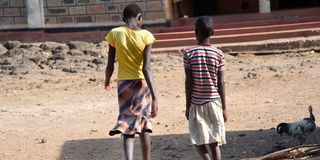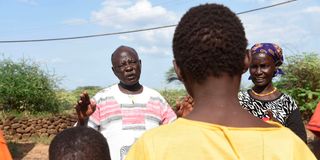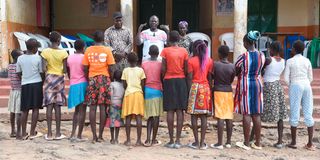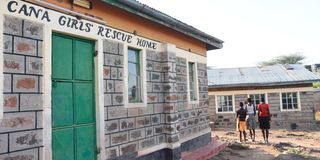Four days through the desert: The sisters who walked 80 kilometre to find freedom

Two sisters aged nine, and 14, from Tiaty East on December 12, 2024. They trekked for two days for more than 80 kilometres from Tiaty East in Baringo County, to Cana Girls Rescue Home in Nginyang, Tiaty Constituency of Baringo County.
What you need to know:
- Two sisters aged 9 and 14, fleeing child labour and parental neglect, walked for four days across 80 kilometers of harsh Baringo terrain with nothing but the clothes on their backs and a dream of education.
- The girls who slept in the bush during their journey, finally found refuge at Cana Girls Rescue Centre in Tiaty West - the only such sanctuary in Baringo County that protects girls from forced marriages, FGM, and abuse.
- In pastoral communities, only 30 percent of girls access education and many are viewed merely as sources of wealth.
A gentle breeze carries the sound of hymns across the dusty compound of Cana Girls Rescue Centre in Tiaty West, where dozens of young girls are going about their afternoon chores.
Among them are two sisters, Chepeng'at, 14, and Cheperur, 9, their hands busy with newly-donated clothes they are washing. Their movements are tentative, their bodies still bearing the exhaustion of an extraordinary journey that brought them here just two weeks ago.
The sisters' tired eyes and weather-beaten faces tell a story of determination that drove them to walk for four gruelling days across the rugged terrain of Baringo County, fleeing the chains of child labour that bound them in their home in neighbouring Tiaty East Sub-county.
Their destination was this sanctuary – the only one of its kind in Baringo County – where girls find refuge from forced marriages, female genital mutilation (FGM), and other forms of abuse that continue to plague their communities.
Inside the rescue centre's compound, the afternoon sun casts long shadows as 59 girls move about their daily routines. Their cheerful songs mask the heavy burdens many of them carried here – stories of escape from practices that have long haunted the young girls of the Pokot, Samburu, Turkana, Ilchamus, and Tugen communities.

Canon Christopher Chochoi, Director of Cana Girls Rescue Home in Nginyang, Tiaty Constituency of Baringo County, and Christine Karungole, the home’s matron, speak to the two sisters from Tiaty East on December 12, 2024.
Chepeng'at, the older of the two sisters, pauses from her washing, her hands dripping with soapy water as she recalls their harrowing escape.
"We left home at 5pm that evening," she says, her voice barely above a whisper.
"We had nothing but the clothes on our backs and a dream of education that our parents had denied us."
Her words paint a picture of a home fractured by abandonment and addiction.
"Our father fled years ago, leaving us with our mother and her co-wife, who has five children of her own," Chepeng'at explains, her fingers nervously fidgeting with the hem of her partly torn T-shirt.
"Both mothers found solace in alcohol, perhaps to escape the overwhelming burden of parenting. We were left to fend for ourselves and our younger siblings, often with empty stomachs and hearts heavy with unfulfilled dreams."
The sisters' daily routine had been a gruelling cycle of fetching water and firewood for neighbours, walking countless kilometres under the scorching sun to supply local brewers of busaa and chang'aa – illegal brews that ironically contributed to their own family's struggles.
"We would watch our peers walk to school while we headed in the opposite direction, carrying our heavy burdens," Chepeng'at recalls, fighting back tears. "Our pleas for education fell on deaf ears."
The decision to flee came after years of watching their siblings suffer the same fate – some already married off, others trapped in the same cycle of poverty and child labour. Their journey, spanning more than 80 kilometres, became a testament to their desperation for a different life.

Canon Christopher Chochoi, the director of the centre, accompanied by James Cox, a social worker, and Christine Karungole, the centre’s matron, speak to rescued girls at the home on December 12, 2024.
"We slept in the bush when darkness fell," Chepeng'at recounts, her younger sister Cheperur drawing closer to her as she speaks.
"Wild fruits became our sustenance. By the second day, our bodies ached from hunger and exhaustion." A compassionate stranger provided them temporary shelter and food before they continued their journey to Nginyang' Police Station, where authorities finally brought them to the rescue centre.
Cheperur, usually quiet and reserved, finds her voice when speaking about her dreams.
"I will not go back home until I get what I want in life – education," she says firmly, wiping away tears with the back of her hand. "I want to become a teacher."
Her sister's ambitions reach equally high: "I dream of becoming a doctor and helping my younger siblings," Chepeng'at adds, her eyes bright with determination despite her fatigue.
James Cox Arimonyang, a social worker at the facility, explains that these sisters' story is far from unique in a region where girls are often viewed merely as sources of wealth.
"Only about 30 percent of girls in this region have accessed education," he says, his voice heavy with concern.
"Girls as young as 12 to 15 are subjected to female genital mutilation and then married off, mostly to older men. These harmful practices continue to thrive, especially in remote villages."

Cana Girls Rescue Home in Nginyang, Tiaty Constituency of Baringo County, on December 12, 2024. The home is hosting among others, two sisters aged nine, and 14 years old from Tiaty East, who trekked for two days from Tiaty East in Baringo County.
The rescue centre itself stands as a testament to the power of compassion and determination. Retired Canon Chochoi, who founded the centre in 2002, remembers its humble beginnings with a single girl who had fled a forced marriage in Churo.
"She had walked more than 100 kilometres to Nginyang'. I had no proper structure then, so I gave her one of my grass-thatched houses," he recalls. Today, the centre has grown to include two modern dormitories that can accommodate more than 68 girls.
Since its inception, the centre has transformed hundreds of young lives.
"More than 200 girls have passed through this home, and some have since graduated from university," Chochoi says with pride. However, the centre faces its own struggles, relying heavily on well-wishers and churches after several donors withdrew their support.
As we depart from the rescue centre, Chepeng'at and Cheperur prepare for their evening meal – a simple but reliable comfort they couldn't count on at home. Their faces show exhaustion but also hope, their dreams of education finally within reach. Come January, they will join their peers in school for the first time, marking the beginning of a new chapter in their young lives.




